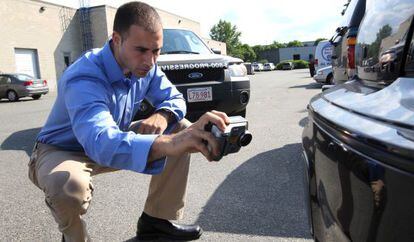“Every minute and 16 seconds a false insurance claim is made in Spain”
Companies are increasingly turning to investigators in a bid to combat fraud


An employee of a company falls from a forklift truck owned and maintained by another firm. The employer of the injured man files a claim. The insurer, in this case AIG, is puzzled, and sends one of its investigators to look into the matter. The detective uncovers a fraud with an unusual back story: the administrator of the company had been having a long-running affair with the head of the company that owned the forklift truck, which not only didn’t have insurance, but was also employing immigrants without papers and used defective machinery. The pair cooked up a scheme to free her of any legal responsibility for the accident, thus avoiding the possibility of the authorities discovering what she had been doing.
This is just one of the 156,000 attempts at insurance fraud detected in 2014, and that saved Spain’s insurance companies around €426 million, according to a report published this month by UNESPA, which represents 30 companies in the sector. In recognition of his efforts, the investigator who uncovered the aforementioned scam was a runner up in UNESPA’s annual awards.
There are even criminal gangs in operation who are prepared to fake car accidents
The report shows that the majority of insurance fraud is for less than €500, and that since the crisis began in 2008, growing numbers of people, as opposed to businesses, have tried to fool their insurers. There are even criminal gangs in operation who are prepared to fake car accidents.
In fact, 70 percent of the attempted schemes reported by UNESPA’s members involved car insurance. The association’s top prize went to the investigator who discovered a complicated swindle that required the help of expert witnesses, doctors and even family members of the fraudster, a 72-year-old man who was knocked off his bicycle. The man put in a claim for total and permanent disability, alleging he was no longer able to speak as a result of the accident, which had also left him unable to travel. His wife said he was in constant need of psychological help. “There is a tendency to increase the cost of compensation. In this case the amount being claimed went up from €49,000 euros to €210,000,” says Pedro Guzmán of insurers FIATC. The elderly man even refused to testify in court: “He went to theatrical lengths to prove he couldn’t move or speak.”
The classic scams
- Motor insurance: claiming for existing damages not caused in the accident; claiming for existing injuries not caused in the accident
- Home insurance, civil responsibility and others: faked accidents (27.4 percent)
- Personal insurance (life, accidents, health): falsifying identity documents and medical or death certificates
In the end, it was a friend of the doctor treating the elderly man who alerted the insurance company. He had seen the claimant at a family gathering talking and moving normally. The insurers put an investigator on the case who noted that while the man’s movements and speech were slow, he was far from incapacitated. “The investigator asked him for street directions and he answered without any problem,” says Guzmán. In the end, the insurers paid out a small amount of compensation.
Other frauds UNESPA reported were even more complicated, involving several people. A Spanish fishing vessel sank off the coast of Africa in near perfect weather conditions and while at anchor. The crew was rescued by a nearby ship. The insurers, Mapfre, noted that the vessel had gone down in less than three hours, which is unusually quick. The company then discovered that the boat had undergone major repairs six years earlier that had destabilized it, although the ship owner denied this.
“We shouldn’t generalize. We’re not pursuing something widespread here, but there are actions that damage society as a whole,” says Juan Antonio Fernández of the Pelayo insurance company. At the same time, as UNESPA’s Eduardo González points out: “Every minute and 16 seconds a false insurance claim is made in Spain.”
Andalusia: Spain’s most fraudulent region
Broken down on a regional basis, Andalusia is where the greatest amount of insurance fraud was discovered, with a total of 34,639, or an average of 4.13 dodges per thousand people. Madrid came next in UNESPA’s ranking, with 4,000 people putting in fraudulent claims in 2014.
At the other extreme are Aragón and the Basque Country, which between them barely registered 2.5 frauds for every thousand people. Overall, the number of fraudulent claims rose by 4,000 on 2013, but the increase over the decade has been steep: from 54,114 in 2003 to 130,959 by 2011.










































